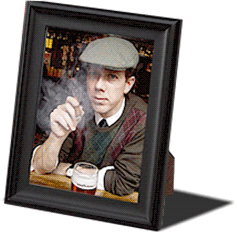|
|
|||||
|
28 November 2006 |
|||||
|
|
|||||
| Informal Smoker, Tuesday, November 28, Tower Club, 5-7pm | |||||
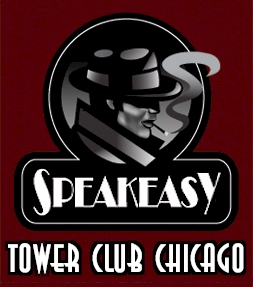 Speakeasy
at the Tower Club. As dusk falls heavily and early this late
November day in the City of Big Shoulders, push through the throngs
swarming toward the trains at Union Station and make your way to the
Civic Opera House. Take the center elevator to the 39th floor
(there is no number on the button), then walk to the left down the hall
to the last door on the right, and knock with code "-·· ---".
Nonmembers pay $40 in cash to the big man with the shock of silver hair
and slate-gray pinstripes; members sign a chit for $30. An
untended open bar stocked with your premium favorites and light snacks
are included. (Alternatively you can open a chit with Alfredo "Rudy the Bartender" Galván, down
the hall.) Bring your own cigars. This event is
brought to you courtesy of David "King" O'Connor,
J. D. "Waxey" Johnson, Jerry "Beanman" Bauman,
Alexander "the Great" Sherman, John
"Baby Face" Nelson, and "Mean"
Jeff Dean. Speakeasy
at the Tower Club. As dusk falls heavily and early this late
November day in the City of Big Shoulders, push through the throngs
swarming toward the trains at Union Station and make your way to the
Civic Opera House. Take the center elevator to the 39th floor
(there is no number on the button), then walk to the left down the hall
to the last door on the right, and knock with code "-·· ---".
Nonmembers pay $40 in cash to the big man with the shock of silver hair
and slate-gray pinstripes; members sign a chit for $30. An
untended open bar stocked with your premium favorites and light snacks
are included. (Alternatively you can open a chit with Alfredo "Rudy the Bartender" Galván, down
the hall.) Bring your own cigars. This event is
brought to you courtesy of David "King" O'Connor,
J. D. "Waxey" Johnson, Jerry "Beanman" Bauman,
Alexander "the Great" Sherman, John
"Baby Face" Nelson, and "Mean"
Jeff Dean. |
|||||
|
THIS MONTH IN GANGSTER HISTORY:
—Courtesy of Rick "Mad Dog" Mattix. |
|||||
|
|
|||||
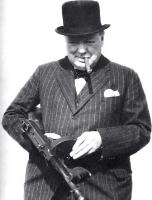
¬
"British Prime Minister Winston Churchill poses with a borrowed Tommy
gun, July 1940. German propaganda used that photo to portray
Churchill as a Chicago style gangster.
® "The picture taken just before the famous one. This shows Churchill somewhat delicately borrowing the weapon during a visit to Yorkshire at the end of July 1940. Notice how the people surrounding him disappeared rather smartish after he got hold of it." |
|||||
|
|
|||||
| Reading | |||||
Chicago Stories: A Cigar from Mr. Capone
Lynn Harry Nelson The doors of John Fiske Elementary School, 61st and Ingleside, Chicago, Cook County, Illinois were four in number, forming two pairs of heavy oak slabs, blackened as were most other doors in a city heated and run mainly by coal and for which the term "natural gas" had a vaguely risque ring to it, being supposed by many to refer a disordered digestion. Each day at exactly 8:00, these doors were swung open and somehow or another locked in place by two large men who were popularly believed by the entire neighborhood to have obtained their door-opening sinecure through some vague relationship with a much-admired Chicago businessman named Mr. Capone. This supposition was based upon the fact that they were white and were not seen around the school after their morning task. Moreover, since it was well-known that Mr. Capone and his associates were involved in the welfare of every establishment in South Chicago, there seemed no reason to believe that John Fiske Elementary School was somehow exempt. Even now I am not sure that this was not in fact the case. I understand that the reputation of Mr. Capone has come under something of cloud recently, but in the place and time of which I speak, one would have had to look far, perhaps as far as Lawndale Cemetery, where so many good Democratic voters resided, or the Calumet City Sanitation Canal, to have found someone who did not have a good word to say for him. Indeed, my friends and I were great admirers, being, in a fashion and quite irregularly, on the Capone payroll. At the corner of 63rd and Cottage Grove Avenue was a cigar store, a kind of establishment that, to the best of my experience, no longer exists. Along one long wall was a polished glass and teak counter, and, behind it, floor to high ceiling teak shelves with hundred of boxes of cigars from all over the world kept safe behind polished glass sliding doors. At the front of the aisle, near the cashier's chair, there were forty-two porcelain jars (I counted them many times and memorized their names) of various kinds of tobacco that were blended in the shop to each customer's special taste. Well-dressed gentlemen would frequently come in and say softly to the cashier, "Two hundred to my home," and leave. I eventually discovered that these gentlemen were placing orders for cigarettes to be made up for them and delivered. The store never admitted to selling cigarettes. Whoever it was that owned the establishment felt that cigarettes were unsightly, evil-smelling, and effeminate, so the cashier said, but believed that one served one's clients, no matter how depraved their tastes. I was seven years old when I undertook to polish teak and mop the white and black mosaic marble floors of the cigar store for an hour each three afternoons a week. There was no question of money; I simply loved the smell of the tobacco and the sheen of the teak, and just walked in one day and said, "I wanna polish d'wood." The cashier took an oiled cloth (it, too, had a wonderful smell about it) from under the counter, tossed it to me, and said, "So polish." When he saw that I kept coming back, he undertook my education. It was there I learned to make change, always using the touchstone. It had not been too many years since gold coins had been called in, and a number of businessmen still habitually used a touchstone. A true gold coin drawn lightly across a touchstone would leave a faint golden streak, but a gold-washed counterfeit coin would leave only a smudge, if anything. True silver coins, correctly tossed on the touchstone, would ring true, counterfeits would yield a slight clang or thud and lie there as if dead. The cashier tested me many times on this skill, and I could still detect the greasy feel of a counterfeit half-dollar if anyone ever made counterfeit half-dollars any more. Or if it made any difference for a mere fifty cents. I learned to make two and three ingredient blends, but was not allowed to touch the ingenious little machine in a small back room by which these blends were made up into cigarettes. The cashier insisted that this would be bad for my nose. Considering that in those ante-antibiotic days, kids normally had low-grade infections of one sort or another and generally had runny noses, this might have seemed undue solicitude on his part, but that was not what he meant. "Smell your customers, boy!" he would say. A customer would enter the store, the cashier would gaze intently at him, his nostrils would flare slightly, and he would say, "Corona Corona number five, sir?" and the customer would nod. I learned only the rudiments of this craft, but did learn that there were hidden depths to it. After a customer would leave, the cashier would look at me with one eyebrow raised, and I would venture, "Kentucky burley?" and the cashier would say, "Lacks imagination, afraid to offend, will marry a nagging wife and never rise in his trade." A customer entered once and the cashier dealt with him in an unusually curt manner. When the man left, the cashier turned to me, and I said, "I couldn't tell. The latakia was too strong." The cashier leaned over and said intently, "When you can smell the latakia, the man is a stubborn and overbearing ass, without taste or consideration for himself or others. He has corrupted his own tobacconist and cannot be trusted." This was perhaps too sweeping a judgment, but I have been told that Josef Stalin added too much latakia to his Edgeworth. One Friday, the collector came in, as he always did, and the cashier took out the standard five dollars and the week's ledgers for the store's other enterprises, which were multifarious and far too complex for me to explain in this short essay. This Friday, the collector looked at me and asked the cashier, "What's the kid hanging around for?" The cashier answered, "He polishes and carries ... things." "Oh, Okay. What do you pay him? "Nothing. He likes to smell, and I teach him things." The collector stood there and looked me up and down, which was not a long trip. He finally asked, "What do you carry, kid?" I answered, "Carry? What carry?" He turned to the cashier and said, "Pay the kid," and walked out with the week's protection money and the ledgers. The cashier looked rather sad and said, "So, I have to pay you." I was old enough to know what was bothering him. Apprentices don't get paid, especially apprentices who have just turned eight. I had gotten a soft blue denim bib apron from the cashier, just like his own, for my birthday, and my future seemed to be taking shape right under my nose, as it were. I said, perhaps somewhat plaintively because I do remember that I felt that things were changing, and not necessarily for the good, "I don't want to get paid," and the cashier said, "You gotta get paid. The man said so. How much do you want." I was almost in tears, but apprentice tobacconists don't cry. I suddenly had an idea and said, "I don't want no money, but you could give me a cigar on Friday afternoon to give to my grandfather on Saturday." Grandfather and everyone else went to a tavern on Saturday night, and the aroma of a good cigar was something everyone in the place could enjoy, or so I thought. The cashier brightened up and said, "Sure, I could do that. It would be like a present to your grandfather. What kind does your grandfather smoke?" Blood is thicker than water, so I quickly said, "Havana panatela, Supremo deluxe, number ones." The cashier replied, just as quickly, "Done!" It was only then that he began to frown. "Wait a minute," he said, "Havana panatela, Supremo deluxe, number ones cost ..." "Sixty cents each," I supplied. At supper the next evening, I told my grandfather that I had a present for him, and presented him with a cigar. He looked at it, and then suspiciously at me. You see, weekly wages for grown men at that time in the stockyards were twelve to thirteen dollars for a forty-eight hour week. He was holding about two and a half hours of hard work in his hand, something of which I had no idea at the time. "Where did you get this?" he said rather ominously. I was not paying too much attention at the time, being absorbed in watching my mother prepare a cup of coffee for me, so I answered somewhat off-handedly, "It's a present from Mr. Capone." My grandfather started to say something, but my father forestalled him by saying, "Don't ask, Harry. We probably don't want to know." My mother handed me my coffee, and there was an extra lump of sugar on the saucer. —From Don Mabry's Historical Text Archive. |
|||||
|
|
|||||
| Pipe Dreams, a new regular column on pipe smoking, by Jeffrey Dean | |||||
|
|||||
|
|
|||||
|
Upcoming Smoking Events... |
|||||
 After
the Speakeasy on the 28th, there
are no more regular cigar meetings until the new year; look for the next
issue of this newsletter for the schedule. However, those
interested can meet on Thursday, December 14,
in the University Club Presidents Bar, after the Artist
Reception, for a smoke and a drink. After
the Speakeasy on the 28th, there
are no more regular cigar meetings until the new year; look for the next
issue of this newsletter for the schedule. However, those
interested can meet on Thursday, December 14,
in the University Club Presidents Bar, after the Artist
Reception, for a smoke and a drink.
|
|||||
|

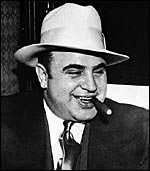 November 1--Bank robber John Ashley and three gang members are killed in
a police ambush at Sebastian, Florida {1924}; Legendary lawman Bill Tighlman is shot dead by corrupt Prohibition agent Wylie Lynn in
Cromwell, Oklahoma {1924}; Speakeasy owner and former Deputy U.S.
Marshal Joseph V. Sheridan is killed by a gunman at the Lone Owl Club
speakeasy at 518 West 47th Street in New York {1925}; Charles "Pretty
Boy" Floyd, George Birdwell, and Aulcie "Aussie" Elliott rob the bank in
Floyd's hometown of Sallisaw, Oklahoma {1932}; Verne Miller battles
federal agents and escapes from Sherone Apartments at 4423 Sheridan Road
in Chicago {1933}.
November 1--Bank robber John Ashley and three gang members are killed in
a police ambush at Sebastian, Florida {1924}; Legendary lawman Bill Tighlman is shot dead by corrupt Prohibition agent Wylie Lynn in
Cromwell, Oklahoma {1924}; Speakeasy owner and former Deputy U.S.
Marshal Joseph V. Sheridan is killed by a gunman at the Lone Owl Club
speakeasy at 518 West 47th Street in New York {1925}; Charles "Pretty
Boy" Floyd, George Birdwell, and Aulcie "Aussie" Elliott rob the bank in
Floyd's hometown of Sallisaw, Oklahoma {1932}; Verne Miller battles
federal agents and escapes from Sherone Apartments at 4423 Sheridan Road
in Chicago {1933}.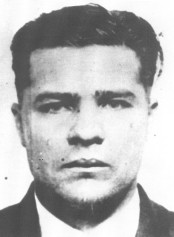 November 7--Fred "Killer" Burke suspected in Jefferson, Wisconsin bank
robbery {1929}; "Baby Face" Nelson and an accomplice are thwarted by
bulletproof glass tellers' windows in an attempted bank robbery in
Plainfield, Illinois {1930}; "Pretty Boy" Floyd is suspected in Henryetta, Oklahoma bank robbery, though actual robbers were probably
the Ford Bradshaw gang {1932}; Alvin Karpis and others rob U.S. Mail
train of $44,650 at Garrettsville, Ohio and escape in airplane {1935}.
November 7--Fred "Killer" Burke suspected in Jefferson, Wisconsin bank
robbery {1929}; "Baby Face" Nelson and an accomplice are thwarted by
bulletproof glass tellers' windows in an attempted bank robbery in
Plainfield, Illinois {1930}; "Pretty Boy" Floyd is suspected in Henryetta, Oklahoma bank robbery, though actual robbers were probably
the Ford Bradshaw gang {1932}; Alvin Karpis and others rob U.S. Mail
train of $44,650 at Garrettsville, Ohio and escape in airplane {1935}.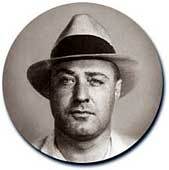 November
11--New York police find gangster Ederiage "Louis the Barber"
Guiliano stabbed to death in a Greenwich Village alley {1919}; New York
police arrest Louis "Lepke" Buchalter, Jacob "Gurrah" Shapiro, Benjamin
"Bugsy" Siegel and six others in raid on gangster conference at Hotel
Franconia {1931}.
November
11--New York police find gangster Ederiage "Louis the Barber"
Guiliano stabbed to death in a Greenwich Village alley {1919}; New York
police arrest Louis "Lepke" Buchalter, Jacob "Gurrah" Shapiro, Benjamin
"Bugsy" Siegel and six others in raid on gangster conference at Hotel
Franconia {1931}. November 18--Charlie Birger kills St. Louis gangster "Whitey" Doering at
his Halfway resort, again getting off on self-defense {1923}; James
Dalhover, survivor of Indiana's Al Brady gang, is executed for murder in
the electric chair at Michigan City, Indiana state prison {1938}.
November 18--Charlie Birger kills St. Louis gangster "Whitey" Doering at
his Halfway resort, again getting off on self-defense {1923}; James
Dalhover, survivor of Indiana's Al Brady gang, is executed for murder in
the electric chair at Michigan City, Indiana state prison {1938}.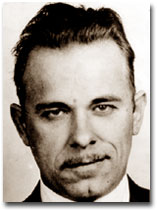 November 24--"Pretty Boy" Floyd is convicted of a Sylvania, Ohio bank
robbery and sentenced to 12-to-15 years {1930}; Dillinger Gang member
Leslie Homer is captured in Chicago {1933}.
November 24--"Pretty Boy" Floyd is convicted of a Sylvania, Ohio bank
robbery and sentenced to 12-to-15 years {1930}; Dillinger Gang member
Leslie Homer is captured in Chicago {1933}.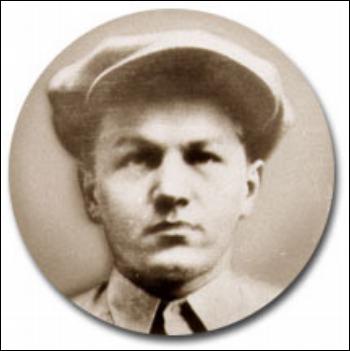 November 27--"Baby Face" Nelson is mortally wounded but escapes
after killing federal agents Sam Cowley and Herman Hollis in a gun
battle at Barrington, Illinois {1934}.
November 27--"Baby Face" Nelson is mortally wounded but escapes
after killing federal agents Sam Cowley and Herman Hollis in a gun
battle at Barrington, Illinois {1934}.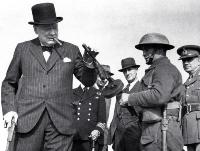 Churchill
probably enjoyed that."
Churchill
probably enjoyed that."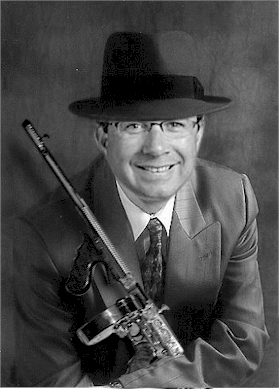
 December
1. Club member Alexander SHERMAN invites the Cigar Society to take
part in his long-running symposium on
The Creative Force of the City, Especially This
One—And Grilled Cheese. This
year's last installment will be on Friday, December 1, 5:30-8:30pm, and will include civic
discussion, pisco sours á la Victor TUTIVEN, and grilled cheese sandwiches; a second shift will accommodate
those unable to attend early. To be held at the Equitable Trust Company,
Suite #402 in the Fisher Building (343 South Dearborn, between Jackson
and Van Buren).
December
1. Club member Alexander SHERMAN invites the Cigar Society to take
part in his long-running symposium on
The Creative Force of the City, Especially This
One—And Grilled Cheese. This
year's last installment will be on Friday, December 1, 5:30-8:30pm, and will include civic
discussion, pisco sours á la Victor TUTIVEN, and grilled cheese sandwiches; a second shift will accommodate
those unable to attend early. To be held at the Equitable Trust Company,
Suite #402 in the Fisher Building (343 South Dearborn, between Jackson
and Van Buren). 